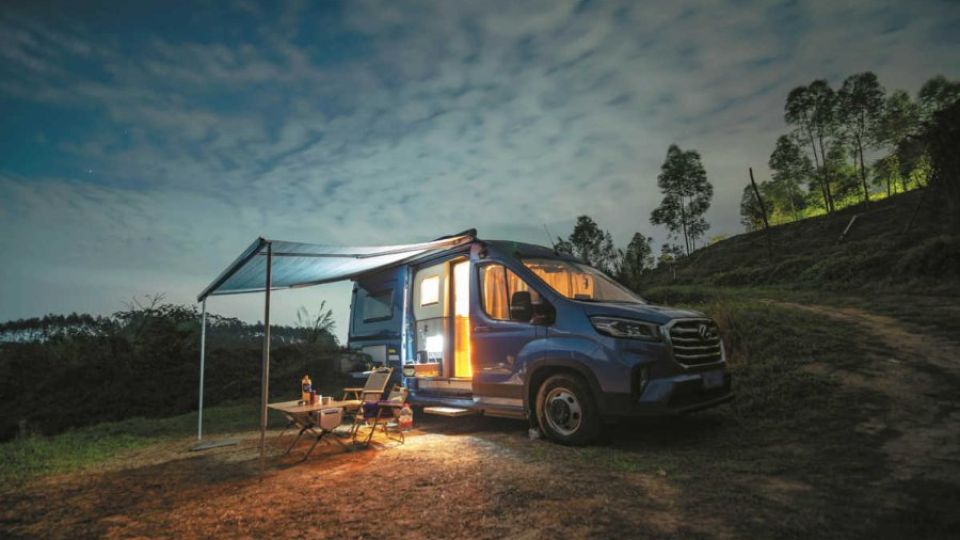February 24, 2023
SHANGHAI – Ownership rises as more families seek diverse lifestyles
In the past decade, recreational vehicles, or RVs, have become increasingly popular in China — offering owners more freedom to enjoy diverse lifestyles.
According to rental company rv2go, more than 65 percent of RV owners are parents in the 30 to 45 age group living in first- and second-tier cities. They aim to use their vehicles as mobile homes for relaxing family trips to different areas of the country.
Du Luting, senior social media executive at Yuchen RV(Shanghai) Co, said: “More people are now buying these vehicles, which used to be the exclusive preserve of the wealthy just a decade ago. They are using them as mobile homes or for tourism.”
In July 2020, Sun Lin, 30, and his wife made an impulsive but life-changing decision to quit their stable jobs to buy an RV for a road trip, even though Sun’s wife was expecting a baby in the coming spring.
“We left our jobs, as we wanted to live a freer and more comfortable life. Using an RV as a mobile home on a road trip is a cool way to travel,” said Sun, who used to work at a State-owned enterprise, while his wife was a teacher.
“We moved from Harbin (capital of Heilongjiang province) to Hangzhou (the provincial capital of Zhejiang) to buy an RV in May 2020 and prepare for the trip.”
As a first-time owner, Sun chose the vehicle for its stylish design, which featured a signature large window at the rear. The couple set off on their trip from Hangzhou in July that year, when Sun’s wife was three months pregnant.
They spent the following four months traveling through Sichuan, Jiangxi, Hunan and Guizhou provinces — arriving in Hainan province in November.
“Traveling by an RV gives us more freedom. If we want to go to a particular place, we can sleep nearby, get a closer glimpse of local life, and relax,” Sun said.
The couple stayed in Hainan for the birth of their son, before continuing their trip in spring 2021, when he was more than three months old.

Sun Lin and his wife take their son to a beach in Hainan province. CHINA DAILY
While they were in Hainan, they drove the RV to an area close to a beach, where they created a makeshift small backyard and even built a small sandcastle for the boy.
“For us, the most important thing about a trip by RV is that it gives us a better life. Although our vehicle is comparatively small, it enables us to embrace nature anytime and anywhere we want to,” Sun said.
Two types of RV are available in China — self-driven motor homes and towable vehicles or trailers. The former are relatively small, while the latter provide more space but require an additional vehicle. According to national traffic regulations, motor homes should be no more than 6 meters long.
To provide a more comfortable living area for the family, Sun decided to change his RV to a larger-sized towable vehicle.
“Every coin has two sides. We chose a towable RV, which is more comfortable and gives us additional space. We can now better plan trips and locate camping sites, as we want our child to enjoy the journey and get closer to nature with ourselves and our pet,” said Sun, who brought a border collie during the trip.
He plans to buy a property in Hangzhou in order to have a permanent address for their kid to be enrolled in school, but the couple is determined to continue the trips.
“We want to enjoy different experiences together. We always look forward to our next trip and next destination,” Sun said.

Lu Yinuo and her husband spent 460,000 yuan on a RV last year to experience camping holidays with their family. CHINA DAILY
Market growth
According to statistics released by the China Automobile Dealers Association in March, the nation’s RV market grew by 30 percent in the past two decades. The first such vehicle independently developed and produced domestically came off the production line in 2001.
A report from Intelligent Research Group shows that the number of RVs in China rose from 48,600 to 69,432 from 2016 to 2017, and in 2020, the total exceeded 218,000.
In 2019, a total of 459,700 trips were made in self-owned RVs in China, and 72,500 journeys were taken in rented RVs. The following year, 648,100 trips were made in self-owned RVs, while the number of journeys taken in rented vehicles fell to 71,000.
Du, from Yuchen RV (Shanghai) Co, said, “The RV market in China is quite small compared with those in the United States and Europe, but it is expected to witness promising development, especially following the emergence of the COVID-19 pandemic in 2020.”
The increased popularity of camping in smaller RVs priced from 200,000 to 300,000 yuan ($29,140 to $43,710) has attracted more young people to pursue so-called Vanlife (van plus lifestyle).
Vanlife, which has become popular globally in recent years, is pursued by the younger generation seeking more freedom. Numerous Vanlife videos have been posted on various social media platforms, attracting large audiences.
Influenced by Vanlife, Lu Yinuo, 33, from Hangzhou, spent 460,000 yuan on an RV last year for her family to enjoy camping holidays.
“In recent years, the term work-life balance has gained traction among the younger generation. I believe more young people will pursue freedom and pleasure in the future,” said Lu, who has been on weekend camping trips with her family for the past two years.
A long period of traditional camping left Lu and her husband a little exhausted, so he proposed buying an RV. As the couple planned to have a second child, they thought a mobile home would be more convenient for camping and traveling.
The couple uses the vehicle as a remote office on weekdays — returning home the same day — for camping during weekends, and for road trips two to three times per year.
“We used to travel the world every year, so my first child had been to 11 countries before turning 4. The COVID-19 pandemic didn’t stop us exploring and longing to see more of the world, and my family really took to camping,” Lu said.
After buying the RV, the couple no longer needed to worry about preparing sleeping bags and packing lamps, kitchenware, food and heating equipment for trips in winter. Lu and her husband now have more time and energy to play with their children and enjoy a slow-paced life while camping.
“Life on the road is always full of surprises, difficulties and joy — time when we solve problems and enjoy nature. The children see insects and plants they learn about from picture books, and become more adventurous in trying new things,” Lu said.
She added that her son realized his dream of falling asleep under the stars, before waking to see the sun rise.
According to the 2021 China RV Market Inventory released by the China Automobile Dealers Association, the annual sales volume for domestic self-driven RVs reached 12,582 in 2021, a rise of 43.2 percent year-on-year. The monthly average sales volume exceeded 1,000, while annual sales of towable RVs stood at 3,543.
In the first quarter of last year, cumulative sales of RVs reached 2,425, a rise of 17 percent year-on-year — the highest for that period for the past five years.

Mi Yao parks in the countryside. CHINA DAILY
Extensive research
Unlike those buying on impulse, Mi Yao, 31, from Guangdong province, carefully selected his vehicle as a 30th birthday present after carrying out research on RVs for two years from 2020.
When he started working five or six years ago, he had already been to more than a dozen countries. Inspired by the RV culture in Europe and the US, Mi began learning everything he could about the vehicles.
“Compared with a normal road trip, the best things about RV travel are the comfort and the leisurely pace of life, as the vehicle’s facilities and appliances provide me and my family with a greater sense of security. My vehicle is like a fully functional mobile supply depot,” said Mi, who runs a media company that shoots travel videos. Every month, Mi makes an effort to take his parents for outings in the RV, and also travels in the vehicle on his own from time to time.
Although he has not traveled as much as full-time RV bloggers, he has had many unforgettable times on the road.
For example, when a severe spell of cold weather hit Guangdong province, he parked outdoors overnight just to experience the low temperatures. During a heavy downpour, he sat listening to the rain in his vehicle, which was the only one in the parking lot.
“For me, the best thing about RV trips is that they allow me to observe life from different perspectives and get closer to nature. The way in which I communicate has also been broadened by making videos about my RV travels,” said Mi, who posts this footage on different platforms.
He suggests that first-time RV buyers determine whether they really need such a vehicle, and if they can cope with the parking problems that come with it.
“The RV is not a perfect combination of car and home, but it provides us with a new way of life completely different from the traditional. Some owners are full-time RV travel bloggers who travel to different places all year round, while others choose to use the vehicles as their home,” Mi said.
He is now planning to make a trip of 15 to 25 days — his longest yet — possibly to scenic areas such as the southwest and northwest of the country.
Meanwhile, Qu Bei, 34, who comes from Henan province, uses his RV as a temporary home to avoid commuting to work in Beijing.
“Due to the pandemic last year, I had to spend much longer traveling back and forth every day, so I came up with the idea of having an RV as a home, with lower costs and greater efficiency,” Qu said. In 2015 he could not afford an apartment in Beijing, so he bought a small one in a neighboring city.
It took him about three months to decide to buy an RV fitted with solar panels and other facilities. Since then, he has stationed the vehicle in a parking lot near his office, and it takes him just three minutes to get “home” after work.
“The biggest problem of living in the RV is the limited use of water and electricity, so I have to calculate usage regularly to ensure I have sufficient supplies. I also have to overcome noise by wearing earplugs to sleep,” Qu said.
He recently posted a video online comparing life in the RV to living in a rented apartment in Beijing. Qu, who received many inquiries about using the RV as a mobile home, said that perhaps more people want to follow him in exploring the numerous uses of these vehicles.
“They offer a new way of life for Chinese people, as RVs relieve the pressure of buying a property,” he said.
According to QYResearch, the scale of China’s RV market in 2021 rose to 27.17 billion yuan from 2.19 billion yuan in 2014, and was expected to reach 33.43 billion yuan last year.
However, there are still problems to be solved before the RV market achieves mature development in China.
Du said: “There are not enough camp sites for RVs, which is the key factor limiting development of this market in China. Manufacturers of these vehicles should improve quality to meet buyers’ needs, while purchasers should avoid buying on impulse simply to follow a trend.”


